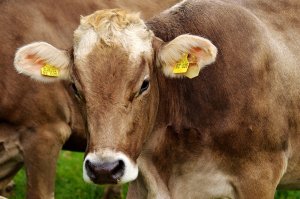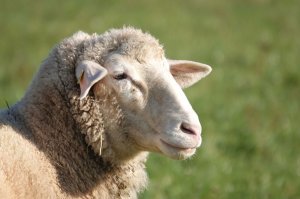Millions of animals are suffering unnecessarily by being slaughtered without stunning to meet religious demands.
That's why we campaign to end religious exemptions to animal welfare laws.
Animal welfare law requires animals to be stunned before slaughter to minimise their pain, suffering and distress. The only exemption is for Jewish and Muslim communities to meet kosher and halal religious dietary preferences.
The scientific consensus is clear that it is more humane to stun an animal prior to slaughter. The slaughter of animals without pre-stunning is permitted in the UK despite a recommendation by the government's own advisory body, the Farm Animal Welfare Council (FAWC), that the practice should be banned. FAWC concluded that animals slaughtered without pre-stunning are likely to experience "very significant pain and distress".
RSPCA, Compassion in World Farming and the British Veterinary Association all support an end to non-stun slaughter to improve animal welfare at the time of death.
- 70% of Brits think stunning animals before slaughtering them is more ethical.
- 72% of the population think food produced from religious non-stun slaughter methods should be clearly labelled.
We support the right to religious freedom. But this is not an absolute right. Religious exemptions shouldn't be made to laws meant to prevent unnecessary animal cruelty.
Take action!
1. Write to your MP
Ask your MP to end the religious exemption that allows animals to be slaughtered without pre-stunning.
2. Share your story
Tell us why you support this campaign, and how you are personally affected by the issue. You can also let us know if you would like assistance with a particular issue.
3. Join the National Secular Society
Become a member of the National Secular Society today! Together, we can separate religion and state for greater freedom and fairness.
Latest updates
NSS criticises non-stun slaughter carve out in animal welfare bill
Posted: Thu, 17 Mar 2022 10:45
The National Secular Society has criticised the government for enshrining religious exemptions from animal welfare laws in a bill meant to protect animals.
The government has backed an amendment to the Animal Welfare (Sentience) Bill that compels advisors to respect "religious rites" when making recommendations on issues regarding animal welfare.
The bill, which aims to protect animal welfare by recognising animals as sentient beings, will establish an Animal Sentience Committee made up of experts to ensure government policy considers animal sentience.
But the amendment says recommendations made by the Committee "must respect legislative or administrative provisions and customs relating in particular to religious rites, cultural traditions and regional heritage".
The amendment replicates similar provisions in the Lisbon Treaty, which the UK is no longer a party to after leaving the European Union.
The amendment was criticised by Henry Smith MP, patron of the Conservative Animal Welfare Foundation and co-chair of the All Party Parliamentary Group for Animal Welfare.
He said: "I don't support this carve-out and think it is unhelpful, as it gives an opportunity for unacceptable exceptions to otherwise effective animal welfare legislation."
The move has been welcomed by representatives of the kosher and halal industry as it could make it more difficult for the committee to recommend removing religious exemptions from slaughter regulations.
Legislation requires all animals to be stunned before slaughter to minimise suffering. The only exemption is for religious communities to meet Jewish and Muslim religious dietary preferences for kosher and halal meat.
The government's own advisory body, the Farm Animal Welfare Council (FAWC), has said that non-stun animal slaughter should be banned completely. The FAWC have concluded that animals slaughtered without pre-stunning are likely to experience "very significant pain and distress" before they become unconscious.
RSPCA, Compassion in World Farming and the British Veterinary Association all support an end to non-stun slaughter to improve animal welfare at the time of death.
A 2015 YouGov poll found almost 80 per cent of the UK wants an end to non-stun slaughter.
NSS head of policy and research Megan Manson called the amendment a "setback for animal welfare".
She said: "This bill represented a golden opportunity to strengthen animal welfare protections in the wake of Brexit.
"Instead, it has been used to protect religious exemptions to the detriment of animal welfare.
"The scientific consensus is clear that slaughtering animals without stunning them is cruel. That's why it's rightly illegal in most circumstances.
"But in a bitter irony, the Animal Welfare Bill is likely to limit the power of advisors to recommend that animals are stunned before slaughter in all circumstances – including for halal and kosher meat."
Religiously slaughtered meat supply outstrips demand, says report
Posted: Wed, 19 Jan 2022 16:19
Millions more animals than necessary to meet demand are religiously slaughtered without stunning, according to a recent study.
Analysis by the Conservative Animal Welfare Foundation (CAWF) has found the total oversupply of non-stun meat could range between 32% to 278%. This represents between 34 and 99 million animals unnecessarily slaughtered without stunning each year.
Animal welfare legislation requires all animals to be stunned before slaughter to minimise suffering. The only exemption is for religious communities to meet Jewish and Muslim religious dietary preferences for kosher and halal meat.
But the total meat supplied from non-stun religious slaughter methods is about four times greater than the proportion of Muslims and Jews in the UK, CAWF's analysis found.
The report also warns that 24% of non-stunned sheep meat is exported each year, while an "unknown proportion" of imported meat is non-stun. This could greatly increase the oversupply of non-stun meat in the UK.
The report expresses concerns that the lack of labelling on non-stun meat results in shoppers "unwittingly buying meat from non-stunned animals when they would otherwise consume stunned animals".
NSS research has found meat from animals slaughtered without stunning is widely sold without clear labelling in supermarkets.
In December, an NSS-commissioned poll found 72% of the population think food produced from religious non-stun slaughter methods should be clearly labelled, but 73% are unaware that there is no requirement for such meat to be labelled. Most of the population (58%) believe the religious exemption permitting non-stun slaughter should be removed.
The report also highlights that councils may have blanket policies of only serving non-stunned halal meat in schools. In 2018 NSS research found at least 17 councils across the UK were supplying non-stunned halal meat to their local schools.
The report urges the UK government "to set more stringent requirements for the use of non-stun slaughter so that these methods are only used to fill the direct requirements of religious communities".
MPs concerned about the welfare of animals at the time of slaughter are planning to table an amendment to the Animal Welfare (Kept Animals) Bill to minimise the number of animals killed under the religious exemption.
The government has recently consulted on proposals to make labelling for non-stun slaughtered meat compulsory.
NSS head of policy and research Megan Manson said: "Slaughtering animals without stunning them first results in preventable suffering.
"It's therefore appalling that millions of animals are dying by this cruel method unnecessarily because non-stun meat supply grossly outstrips demand.
"The government must act urgently to put an end to this needless mass scale animal cruelty.
"Compulsory labelling on non-stun slaughtered meat, a 'slaughter to order' requirement and a ban on non-stun meat exports will go a long way to reducing the number of animals killed by this method while religious exemptions to animal welfare laws remain in place."
Image: Uschi Dugulin, Pixabay




